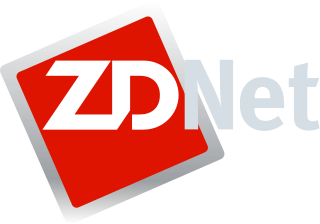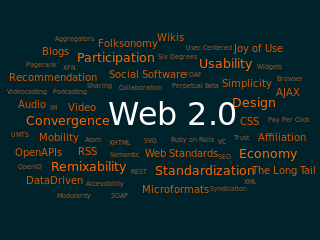Slashdot is a social news website that originally billed itself as "News for Nerds. Stuff that Matters". It features news stories on science, technology, and politics that are submitted and evaluated by site users and editors. Each story has a comments section attached to it where users can add online comments. The website was founded in 1997 by Hope College students Rob Malda, also known as "CmdrTaco", and classmate Jeff Bates, also known as "Hemos". In 2012, they sold it to DHI Group, Inc.. In January 2016, BIZX acquired Slashdot Media, including both slashdot.org and SourceForge. In December 2019, BIZX rebranded to Slashdot Media.

Howard G. Cunningham is an American computer programmer who developed the first wiki and was a co-author of the Manifesto for Agile Software Development. A pioneer in both design patterns and extreme programming, he started coding the WikiWikiWeb in 1994, and installed it on c2.com on March 25, 1995, as an add-on to the Portland Pattern Repository. He co-authored a book about wikis, entitled The Wiki Way, and invented the Framework for Integrated Tests.
A blog is a discussion or informational website published on the World Wide Web consisting of discrete, often informal diary-style text entries (posts). Posts are typically displayed in reverse chronological order, so that the most recent post appears first, at the top of the web page. Until 2009, blogs were usually the work of a single individual, occasionally of a small group, and often covered a single subject or topic. In the 2010s, "multi-author blogs" (MABs) emerged, featuring the writing of multiple authors and sometimes professionally edited. MABs from newspapers, other media outlets, universities, think tanks, advocacy groups, and similar institutions account for an increasing quantity of blog traffic. The rise of Twitter and other "microblogging" systems helps integrate MABs and single-author blogs into the news media. Blog can also be used as a verb, meaning to maintain or add content to a blog.

In Internet activism, hacktivism, or hactivism, is the use of computer-based techniques such as hacking as a form of civil disobedience to promote a political agenda or social change. With roots in hacker culture and hacker ethics, its ends are often related to free speech, human rights, or freedom of information movements.
An online community, also called an internet community or web community, whose members interact with each other primarily via the Internet. For many, online communities may feel like home, consisting of a "family of invisible friends", additionally these 'friends' can be connected through gaming communities and gaming companies. Those who wish to be a part of an online community usually have to become a member via a specific site and thereby gain access to specific content or links, but today's society and economy where media life has been fully integrated into the average day; the online community has stemmed to a full-blow culture. An online community can act as an information system where members can post, comment on discussions, give advice or collaborate, and includes medical advice or specific health care research as well. Commonly, people communicate through social networking sites, chat rooms, forums, e-mail lists, and discussion boards, and have advanced into daily social media platforms as well. This includes Facebook, Twitter, Instagram, etc.. People may also join online communities through video games, blogs, and virtual worlds, and could potentially meet new significant others in dating sites or dating virtual worlds. The rise in popularity of Web 2.0 websites has allowed for easier real-time communication and connection to others and facilitated the introduction of new ways for information to be exchanged. Yet, these interactions may also lead to a downfall of social interactions or deposit more negative and derogatory forms of speaking to others, in connection, surfaced forms of racism, bullying, sexist comments, etc. may also be investigated and linked to online communities.
The blogosphere is made up of all blogs and their interconnections. The term implies that blogs exist together as a connected community or as a social networking service in which everyday authors can publish their opinions. Since the term has been coined, it has been referenced in a number of media and is also used to refer to the Internet.

ZDNet is a business technology news website owned and operated by Red Ventures, along with TechRepublic. The brand was founded on April 1, 1991, as a general interest technology portal from Ziff Davis and evolved into an enterprise IT-focused online publication.

Christopher Joseph Pirillo is the founder and CEO of LockerGnome, Inc., a network of blogs, web forums, mailing lists, and online communities. He spent two years hosting the TechTV television program Call for Help, where he also hosted the first annual Call-for-Help-a-Thon. He now hosts videos on several Internet sites, including CNN, YouTube, Ustream, CBC.ca and his own website.

Web 2.0 refers to websites that emphasize user-generated content, ease of use, participatory culture and interoperability for end users.
A hackathon is a design sprint-like event; often, in which computer programmers and others involved in software development, including graphic designers, interface designers, project managers, domain experts, and others collaborate intensively on software projects.
A social networking service is an online platform which people use to build social networks or social relationships with other people who share similar personal or career interests, activities, backgrounds or real-life connections.
Open Diary is an online diary community, an early example of social networking software. It was founded on October 20, 1998. Open Diary went offline on February 7, 2014, but was re-launched on January 26, 2018. The site was owned and operated by Bruce Ableson and Susan Ableson, known on the Open Diary website by the title of their diaries, The DiaryMaster and The DiaryMistress. Ableson has described Open Diary as "the first web site that brought online diary writers together into a community."
An online diary is a personal diary or journal that is published on the World Wide Web on a personal website or a diary-hosting website.

Kathy Sierra is an American programming instructor and game developer.
A web series is a series of scripted or non-scripted online videos, generally in episodic form, released on the Internet and part of the web television medium, which first emerged in the late 1990s and became more prominent in the early 2000s. A single instance of a web series program can be called an episode or "webisode", however the latter term is not often used. In general, web series can be watched on a range of platforms and devices, including desktop, laptop, tablets and smartphones. They can also be watched on television.
While the term "blog" was not coined until the late 1990s, the history of blogging starts with several digital precursors to it. Before "blogging" became popular, digital communities took many forms, including Usenet, commercial online services such as GEnie, BiX and the early CompuServe, e-mail lists and Bulletin Board Systems (BBS). In the 1990s, Internet forum software, such as WebEx, created running conversations with "threads". Threads are topical connections between messages on a metaphorical "corkboard". Some have likened blogging to the Mass-Observation project of the mid-20th century.

SmartPlanet was an online magazine that covered clean technology and information technology as it related to healthcare, science, transportation, corporate sustainability, architecture, and design. It was part of the business portfolio of CBS Interactive that included BNET and ZDNet and was known for its daily coverage of the technology and energy industries. It stopped publishing on June 30, 2014.
Vertcoin (VTC) is an open-source cryptocurrency created in early 2014 that focuses on decentralization. Vertcoin uses a proof-of-work mechanism to issue new coins and incentivize miners to secure the network and validate transactions.
The Digital Visitor and Resident (V&R) model provides a framework to depict how user preference and habit motivates engagement with technology and the web. V&R is commonly described as a continuum, with two modes of online engagement at either end, making a separation between different approaches to engagement. People operating in Visitor mode have a defined goal or task, and select an appropriate online tool to meet their needs as they arise. For example, using a smartphone to search the internet for directions to a local bookstore, thus finding a particular piece of information online and then going offline to complete the task. There will be little in terms of social visibility or trace when online in Visitor mode. People operating in Resident mode are online to connect to, or to be with, other people. For example, posting to the wall in Facebook, tweeting, blogging, or posting comments on blogs. The web supports the projection of their identity and facilitates relationships. In other words, Residents live a percentage of their lives online. Unlike the Visitor mode, there will be online visibility and presence when in Resident mode. It is very common for individuals to engage online in a mixture of Visitor and Resident modes depending on what they are trying to achieve.







